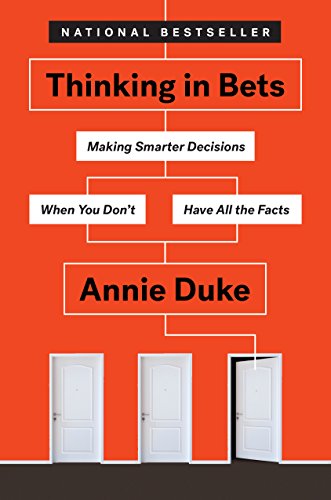7 Decision Theory Books That Shape Smarter Choices
Discover books endorsed by Marc Andreessen, Seth Godin, and Cass Sunstein offering powerful insights into Decision Theory.


What if the choices you make every day could be sharpened by insights from the world’s leading thinkers? Decision Theory isn’t just academic jargon; it’s the science and art behind every choice, from business investments to personal dilemmas. In a world filled with uncertainty, mastering how to decide well is more urgent than ever.
Leaders like Marc Andreessen, who navigates high-stakes investments at Andreessen Horowitz, and marketing pioneer Seth Godin rely on these principles to steer their decisions smarter. For example, Andreessen reflects on Annie Duke’s work, seeing decisions as a portfolio where each choice impacts the whole. Cass Sunstein brings a legal scholar’s lens, emphasizing how small nudges can profoundly influence outcomes.
While these expert-curated books provide proven frameworks, readers seeking content tailored to their specific background, experience level, or decision challenges might consider creating a personalized Decision Theory book that builds on these insights for a custom fit. This way, you accelerate your learning journey with precision and relevance.
Recommended by Marc Andreessen
General Partner at Andreessen Horowitz
“'The decisions you make are like a portfolio of investments.' I believe that almost everything can be viewed as a portfolio — whether it's a set of products a single company decides to make, the schools and jobs and skills an individual invests in, and all kinds of life decisions. The question is, how do we make sure that portfolio as a whole advances you toward your goals — even though any individual decision within it is a win or loss? In this new book, Annie provides exercises for how to decide. All of us — not just investors — should be obsessed with making better decisions.”
by Annie Duke··You?
by Annie Duke··You?
Drawing from her background as a professional poker player and cognitive psychologist, Annie Duke breaks down decision-making into manageable tools you can apply daily. You’ll learn to identify hidden biases, gauge the role of luck, and decide when to act quickly versus deliberating more. The book uses exercises and stories to help you rethink choices in areas from investments to relationships, aiming to reduce second-guessing and increase confidence. If you want to move beyond gut feelings and lists toward decisions that align better with your goals, this book offers a straightforward toolkit.
Recommended by Marc Andreessen
General Partner at Andreessen Horowitz
“A compact guide to probabilistic domains like poker, or venture capital... Recommend for people operating in the real world.”
After a career as a World Series of Poker champion and graduate studies in cognitive psychology, Annie Duke developed a unique approach to decision making that embraces uncertainty rather than denying it. This book teaches you how to think about choices as bets, evaluating probabilities instead of seeking false certainty. You'll explore concepts such as distinguishing skill from luck and learning to make decisions that maximize long-term success, illustrated with examples from sports, business, and politics. If you're looking to improve your judgment in complex situations where information is incomplete, this book offers a shift in mindset and practical mental tools to help you.
by TailoredRead AI·
This tailored book explores the core principles of decision theory, offering a personalized journey through its fundamental concepts and applications. It examines how decision-making processes operate under uncertainty, probability, and risk, presenting these ideas in a way that matches your background and interests. By focusing on your specific goals, the book reveals pathways to mastering decision concepts that resonate with your experience level and desired outcomes. You will engage with topics ranging from utility theory to behavioral influences, all synthesized into a coherent narrative designed specifically for you. This personalized approach transforms complex theory into accessible insights, making your learning experience both relevant and deeply engaging.
Recommended by Daniel Kahneman
Professor of Psychology, Nobel Laureate
“This gem of a book is a must-read for anyone who wants to see both our minds and our society working better. It will improve your decisions and it will make the world a better place.”
by Richard H. Thaler, Cass R. Sunstein··You?
by Richard H. Thaler, Cass R. Sunstein··You?
Richard H. Thaler, a Nobel Prize-winning economist, teamed up with legal scholar Cass R. Sunstein to explore how subtle changes in the way choices are presented can significantly influence decisions. You’ll learn how "choice architecture" shapes behaviors in areas like health, finance, and environmental policy without restricting freedom. The book illustrates concepts through engaging examples, such as default settings in retirement plans and organ donor programs, showing how small nudges can improve outcomes. If you're interested in behavioral economics or want to understand why people often make irrational decisions, this book offers clear insights. However, if you prefer technical economic modeling, it might feel more accessible than rigorous.
Recommended by Massimo Marinacci
Professor, Collegio Carlo Alberto, Italy
“With his seminal works, Itzhak Gilboa is one of the leading figures in the ‘neoclassical’ decision theory that in the past 20 years has considerably expanded the scope of the classical theory pioneered by de Finetti, Ramsey, Savage, and von Neumann. This book provides a superb and much-needed introduction to this exciting research area.”
by Itzhak Gilboa··You?
by Itzhak Gilboa··You?
After analyzing various critiques and extensions of classical decision models, Itzhak Gilboa developed this rigorous exploration of decision under uncertainty. You learn to navigate foundational theories like Savage's theorem while understanding their limitations and alternatives, such as non-additive probabilities and case-based reasoning. The book is particularly suited if you're tackling complex probability concepts or seeking a more nuanced grasp of subjective probabilities and their behavioral definitions. For economists, statisticians, or decision scientists wanting to deepen their theoretical framework, it offers dense but rewarding insights into the underpinnings and evolution of decision theory.
by Itzhak Gilboa··You?
by Itzhak Gilboa··You?
Itzhak Gilboa’s extensive academic career in economics and decision sciences shines through in this book, which explores the practical application of decision theory beyond abstract concepts. You’ll engage with core ideas from microeconomics, game theory, psychology, and philosophy, all presented in accessible language without heavy mathematical jargon. The book challenges you to actively consider scenarios where decision theory can clarify choices, offering a nuanced look at both the strengths and criticisms of the field. If you want to understand how theoretical insights translate into better decision-making in real contexts, this book provides a balanced and thoughtful approach.
by TailoredRead AI·
This personalized book explores actionable steps to enhance your decision-making skills rapidly, focusing closely on your interests and background. It examines key concepts of decision theory, cognitive biases, and risk evaluation, weaving together insights tailored to your specific goals. The book reveals how to recognize patterns in your choices and refine your judgment through targeted exercises designed just for you. By blending foundational knowledge with personalized content, it offers a unique learning experience that bridges expert principles and your individual challenges, helping you build confidence in making smarter decisions within a short timeframe.
by Vincent A. W. J. Marchau, Warren E. Walker, Pieter J. T. M. Bloemen, Steven W. Popper··You?
by Vincent A. W. J. Marchau, Warren E. Walker, Pieter J. T. M. Bloemen, Steven W. Popper··You?
Drawing from decades of expertise in technology assessment and long-term planning under uncertainty, Vincent A. W. J. Marchau and his co-authors dissect complex decision-making in unpredictable environments. You’ll explore five distinct approaches—like Robust Decision Making and Dynamic Adaptive Planning—each explained with their theoretical basis and practical application, including challenging real-world case studies. The book also guides you through actor and network analysis, enriching your understanding of how social dynamics influence strategic plans. If you’re involved in crafting policies or strategies where uncertainty looms large, this book equips you with methods to not only design but also implement adaptable, resilient plans.
by Giovanni Parmigiani, Lurdes Inoue··You?
by Giovanni Parmigiani, Lurdes Inoue··You?
Giovanni Parmigiani, a professor of biostatistics at the University of Washington, brings deep expertise to this exploration of rational decision making under uncertainty. The book dissects core principles of decision theory, offering you clear frameworks to navigate choices when outcomes are unpredictable. You’ll find chapters that unify perspectives from statistics, computer science, and economics, grounded in real-world applications like biostatistics and engineering. For example, it examines how different decision criteria impact statistical practice, challenging you to weigh competing viewpoints and develop your own reasoned approach. If you’re someone who thrives on understanding the foundations behind complex decisions, this book will sharpen your analytical toolkit.
Get Your Personal Decision Theory Guide ✨
Stop guessing. Unlock tailored decision strategies that fit your unique challenges.
Trusted by decision makers and industry leaders worldwide
Conclusion
Across these seven titles, a clear theme emerges: decision-making thrives at the intersection of theory, psychology, and practice. Whether you’re drawn to Annie Duke’s practical tools in "How to Decide" or Itzhak Gilboa’s deep theoretical explorations, these books collectively illuminate pathways through complexity.
If you’re facing personal or professional crossroads, start with books like "Thinking in Bets" and "Nudge" to grasp uncertainty and behavioral nudges. For those tackling strategic or policy decisions, Gilboa’s and Marchau’s works provide rigorous frameworks. Combining these perspectives equips you with a versatile toolkit.
Alternatively, you can create a personalized Decision Theory book to bridge the gap between general principles and your specific situation. These books can help you accelerate your learning journey and make smarter choices every day.
Frequently Asked Questions
I'm overwhelmed by choice – which book should I start with?
Start with "How to Decide" by Annie Duke. It offers practical tools and exercises to improve everyday decision-making without heavy theory, making it perfect to build confidence first.
Are these books too advanced for someone new to Decision Theory?
Not at all. Books like "Thinking in Bets" and "Nudge" explain core concepts accessibly. More theoretical texts like Gilboa’s can be tackled once you’re comfortable with basics.
What's the best order to read these books?
Begin with practical guides like "How to Decide," then explore "Thinking in Bets" for probabilistic thinking, followed by "Nudge" for behavioral insights. Theoretical works can come last for deeper understanding.
Should I start with the newest book or a classic?
Balancing both works well. Newer books often provide fresh applications, while classics like "Theory of Decision under Uncertainty" establish foundational ideas essential for a rounded view.
Which books focus more on theory vs. practical application?
"Theory of Decision under Uncertainty" and "Decision Theory" focus on theory. In contrast, "How to Decide" and "Making Better Decisions" offer practical approaches you can apply immediately.
Can I get tailored insights beyond these books?
Yes! While these titles cover a wealth of knowledge, you can create a personalized Decision Theory book to connect expert insights with your unique goals and context for focused learning.
📚 Love this book list?
Help fellow book lovers discover great books, share this curated list with others!
Related Articles You May Like
Explore more curated book recommendations






